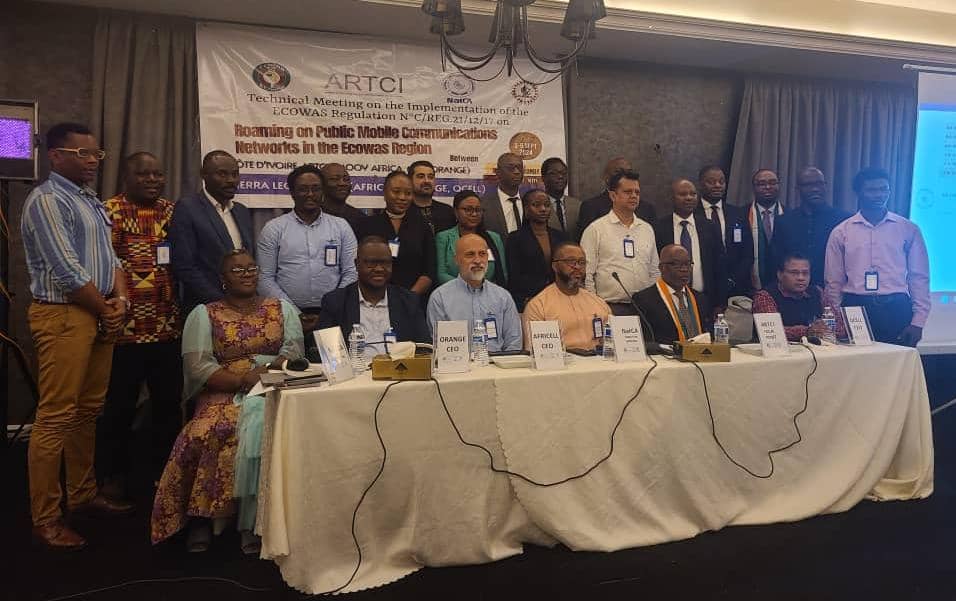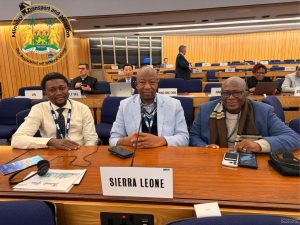NatCA Advocates for Reduced Roaming Fees Across ECOWAS

The Director General of the National Telecommunications Commission (NatCA), Mr. Amara Brewah, opened the meeting by highlighting its significance in enhancing regional connectivity and fostering a strong network of cooperation among West African nations. Mr. Brewah expressed excitement about this gathering of telecommunications experts and stakeholders, emphasizing the impact it could have on improving connectivity not just in Sierra Leone but across the region. “The economic benefits of roaming services are undeniable. We should coordinate and collaborate for the collective good of our countries by reducing roaming charges,” he stated. He pointed out that a more streamlined and affordable roaming system would help improve connectivity, enhance trade, and contribute to the overall growth of the region. More importantly, he stressed, bringing people together through enhanced communication services would help foster a sense of community and mutual care among the ECOWAS member states.
In light of these goals, Mr. Brewah urged all stakeholders to approach the meeting with open minds and a spirit of collaboration to find effective solutions for enhancing ECOWAS roaming services. He emphasized the importance of leveraging collective knowledge and experience to create a more seamless and affordable telecommunications environment, which would ultimately drive economic and social development across West Africa.
Director Musa Jalloh of NatCA welcomed participants, particularly those who had traveled from Ivory Coast, underscoring the significance of their presence and contributions. He highlighted the importance of bilateral engagement among member states, explaining that each country should aim to sign a Memorandum of Understanding (MoU) similar to the one being discussed at the meeting. “As we all know, this regulation aims to address the issues of roaming charges,” he said. He referred to the NATCA Act of 2024, which specifically mandates that the regulatory authority ensures existing operators offer roaming services at an affordable price based on the ECOWAS regional framework. Mr. Jalloh noted that countries like Ghana and Ivory Coast have already begun implementing these regulations and have signed bilateral agreements with other nations in the region to this end.
Mr. Jalloh further emphasized that the focus of the meeting was to deliberate on the MoU between Africell and NatCA. This agreement, he explained, is aimed at enhancing coverage and connectivity by allowing retail mobile networks in both countries to offer their services seamlessly across different regions. Such an arrangement, he argued, would facilitate more robust trade activities by making communication easier and more reliable. As the world transitions from 4G to 5G services, which bring new technological advancements and conveniences, Mr. Jalloh suggested that the collaboration would also address some of the challenges that come with this technological shift.
Representing Orange Sierra Leone, Mr. Sesay lauded the initiative, describing it as a significant step towards regional integration and a more connected West Africa. “We at Orange Sierra Leone are always eager to support initiatives that aim to improve the livelihoods of the people of Sierra Leone, as long as they align with our business objectives,” he affirmed. As a major player in the telecommunications sector, Orange Sierra Leone takes pride in adhering to national regulations and supporting government efforts to enhance connectivity and economic development.
Mr. Sesay commended NatCA and the stakeholders from Ivory Coast for championing the reduction of roaming charges for customers across the region. However, he pointed out the challenges facing telecommunications companies, noting that they have suffered significant revenue losses in recent years due to the evolution of technology and changing consumer behavior. “The majority of our roaming customers have adapted to a new norm of making voice calls via platforms like WhatsApp and other social media, leading to a significant decline in traditional roaming revenues,” Sesay explained. He added that the company is exploring new ways to recover these lost revenues while minimizing the financial impact.
Despite these challenges, Mr. Sesay expressed optimism about the engagement with other stakeholders, looking forward to learning from the experiences of other countries in the region regarding the implementation of the ECOWAS market regulation. “We hope to work closely with all parties to address the concerns raised and find practical solutions that benefit everyone involved,” he stated. He thanked NatCA for organizing the conference and the representatives from Ivory Coast for engaging in this important dialogue in Freetown.
The discussions are expected to continue over the coming days, focusing on building a cohesive strategy for regional connectivity, enhancing cross-border trade, and fostering greater cooperation among ECOWAS countries. The outcomes of these deliberations could pave the way for more affordable and accessible communication services throughout West Africa, ultimately contributing to the region’s socio-economic development and integration.





